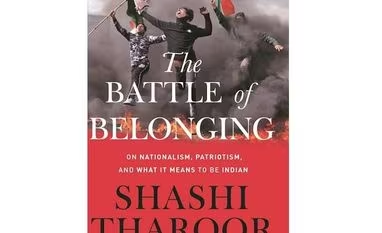What do you expect of a book “that unambiguously establishes what true Indianness is and what it means to be a patriotic and nationalistic Indian in the 21st century”? Such assertions on a book jacket are ludicrous even if the author is a distinguished man of letters. Our vast and diverse population cannot be constrained by a single vision; the assertion glosses over the reality of competing loyalties, identities, and nationalisms.
The Battle of Belonging could have been an outstanding work of scholarship if the author had stuck to exploring how “the very concepts of nationalism and the nation-state (that) are Western in origin” were “exported in perhaps imperfect forms to other parts of the world through colonialism and global networks of trade.” However, the scholarly potential of this book is diminished by the author’s insistence on using it as a vehicle for propaganda.
Shashi Tharoor describes the Indian National Congress, the political party to which he belongs, as “the initiator and principal propagator of Indian secularism” as well as “the safest refuge of the minorities, the weak and the marginalized.” This diplomat-turned-politician seems to need a reminder of the party’s complicity in the anti-Sikh riots of 1984. Giving India Dr Manmohan Singh, a prime minister who is also Sikh, does not absolve the Congress of its contributions to the history of communal violence in India.
It is astounding to learn of Mr Tharoor’s belief that “we are all minorities in India.” According to him, “Hinduism is no guarantee of majority-hood” for a Hindu because “if he is a Brahmin, 90 per cent of his fellow Indians are not; if he is a Yadav, a ‘backward class’, 85 per cent of Indians are not.” This explanation views minorities through the lens of numerical strength rather than access to power through land ownership, caste capital, social networks, and ideas of purity and supremacy enshrined in religion.
Mr Tharoor writes, “The Congress understands that whereas Hinduism is a religion, Hindutva is a political doctrine that stems fundamentally from the principal tenets of the Hindu faith. While Hinduism is inclusive of all ways of worship, Hindutva is indifferent to devotion and cares only about identity. Hinduism is open to reform and progress, which is why it has flourished for 4,000 years.” It is audacious of Mr Tharoor to say so, disregarding centuries of caste oppression, especially when his book claims to be “firmly anchored in incontestable scholarship.”
The Battle of Belonging
Author: Shashi Tharoor
Publisher: Aleph Book Company
Pages: 462; Price: Rs 799
Importantly, the author does not advocate “Western-style secularism” in India because it means “irreligiousness.” What he stands for is “pluralism” or “the active encouragement of religion in this country.” If your patience runs thin trying to decode this, Mr Tharoor provides a culinary metaphor to tickle your imagination. He writes, “Like a thali, we are a collection of different items in different bowls; since we are in different bowls, the dishes don’t necessarily flow into each other, but we belong together on the same platter.”
Believe it or not, the author juxtaposes this thali offered by him with the khichdi he attributes to Mohan Bhagwat — the Sarsanghchalak of the Rashtriya Swayamsevak Sangh (RSS). Apparently, in this khichdi, “we are one dish, with many ingredients all mixed up and cooked together,” wherein “individual pieces might stand out in the mash, a carrot here, a potato there, but they are nothing other than parts of the meal.” The point Mr Tharoor is making here is that a “Hindu Rashtra” would threaten the religious freedoms of people who are not Hindus.
The book deserves kudos for tracing the intellectual underpinnings of Hindutva. Instead of painting all its proponents with the same brush, Mr Tharoor differentiates between M S Golwalkar and Vinayak Damodar Savarkar. He writes, “(Savarkar) opposed cow worship, which Golwalkar exalted, declared that people should eat what they liked and what they could afford, showed little patience for Hindu holy men, advocated an end to the caste system…” Mr Tharoor is not a fan of either but he attempts to understand what led to the present moment.
On the one hand, he draws parallels between Adolf Hitler’s Nazi regime and Narendra Modi’s Bharatiya Janata Party government. On the other hand, he suggests that Hindutvavadis have much in common with 20th century Muslim modernists in South and West Asia —“their conception of a glorious past, their imagining of a fall from that past...their negative appraisal of ‘Western’ values and ‘westernization’...a historical memory of humiliation, and sustained by a continuing sense of insecurity that seems irrational in a majority population.”
Mr Tharoor thinks deeply about things, and spends a considerable amount of time and energy writing books. However, the ability to argue passionately is marred by his reluctance to question the rot in his own party. He acknowledges that the Congress has “acquiesced in recent developments on cow protection, and on the Ram Janmabhoomi temple issue,” but refutes the charge that Congress has become “BJP Lite.”
This accusation is linked to various events, including Rahul Gandhi’s much-publicised temple visits, Digvijaya Singh’s support for bans on cow slaughter and beef consumption, and Kamal Nath’s promise to build gaushalas in every Madhya Pradesh district. Mr Tharoor believes that “any attempt to emulate the BJP will give the voters a choice between the ‘real thing’ and a pale imitation, and most will understandably prefer the original.” This sounds like an honest diagnosis of our political situation.
Unlock 30+ premium stories daily hand-picked by our editors, across devices on browser and app.
Pick your 5 favourite companies, get a daily email with all news updates on them.
Full access to our intuitive epaper - clip, save, share articles from any device; newspaper archives from 2006.
Preferential invites to Business Standard events.
Curated newsletters on markets, personal finance, policy & politics, start-ups, technology, and more.
)